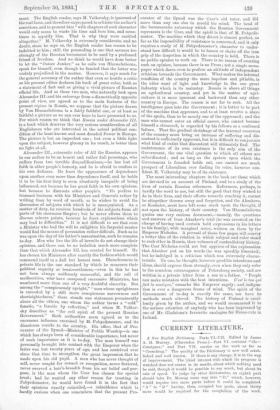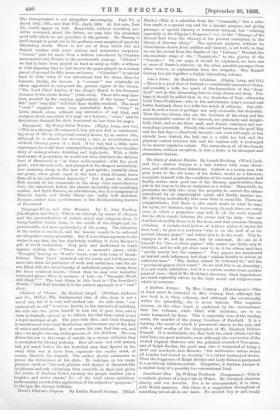CURRENT LITERATURE.
A New English Dictionary. Parts VI.-VII. Edited by James A. H. Murray. (Clarendon Press.)—Pozt VI. contains "do— Consigner," and Part VII. carries on the work as far as "Crouching." The quality of the Dictionary is now well estab- lished and well known. If there is any change, it is in the way of improvement. The :chief interest with 'which its progress is watched does not centre in its merits, about which nothing need be said, though it would be possible to say much, but about its rate of speed. To judge by other dictionaries, an eighth part should take Dr. Murray some way into "D," which, however, would require two more parts before it could be completed. " A " to " D " having, then, occupied ten parts, about thirty more would be required for the completion of the work. The time-prospect is not altogether encouraging. Part VI. is dated July, 1891, and Part VII., April, 1898. At this rate, Part XL. would appear in 1947. Meanwhile, without troubling our- selves overmuch about the future, we may take the abundant good with which we are provided in the present. Dr. Murray is good enough to point out in his prefaces some samples of specially interesting words. There is not one of them which will not furnish readers with some curious and instructive surprises. "Cravat" gets its name from a fashion introduced by Croatian mercenaries into France in the seventeenth century. " Cricket" we find to have been played at least as early as 1548; a witness in 1598 deposing that he bad known the game played on a certain parcel of ground for fifty years and more. "Crinoline" is carried back to 1830, when it was introduced first for shoes, then for bonnets, finally, for dresses. A " coroner " was originally an officer appointed to safeguard the private rights of the Crown. "The Lord Chief Justice of the King's Bench is the Soverain Coroner of the whole Realm" (1640 circa). Those who may have been puzzled by the varying applications of the terms "craw- fish" and " cray-fish " will find their doubts resolved. The word " cross " suggests some very remarkable facts. " Crux " in Latin stands alone, without any derivative of any kind, and occupies about one-ninth of a page in a lexicon ; "cross " and its derivatives demand for their treatment no less than ten pages.



































 Previous page
Previous page